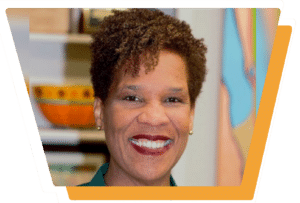Dr. Shanna L. Jackson, president of Nashville State Community College, recently joined the Achieving the Dream Board of Directors. With roots in the business world and a career sparked by a powerful connection to students in the classroom, Jackson leads with a deep commitment to helping learners overcome barriers and achieve their goals. Since becoming president in 2018, she has guided Nashville State through a student-centered transformation focused on holistic support, strong community partnerships, and practical solutions that connect education to opportunity. A two-time Aspen Institute Presidential Fellow, Jackson spoke with ATD about what drives her leadership, the importance of meeting students where they are, and how colleges can be catalysts for personal and economic growth.
Q: Your journey from the business world to higher education leadership was sparked by a deep connection with students. How has that student-centered perspective shaped your leadership at Nashville State, and how does it align with Achieving the Dream’s focus on student success?
A: My career in higher education started as an adjunct business instructor for a two-year proprietary institution in the 90s, and I have carried that classroom experience in every role I have held since then. In the classroom, I saw the power of education in action. I learned that it impacts not just the student but their family and our communities. As someone who knew they were going to college, academically prepared and supported by family, I was unprepared for students who did not have the same experience. And I have dedicated my career to being that support for students. That is exactly what drives our work at Achieving the Dream — ensuring that each student has what they need to complete.
Q: Nashville State serves a diverse urban community with a wide range of student needs. What specific strategies or initiatives have you found most effective in supporting students who face barriers so that they can complete their programs?
A: Nashville State is in the midst of an exciting transformation to become a “student-ready” college. While we are focused on increasing holistic support for all students, two signature programs include Nashville GRAD for full-time students and Nashville Flex for part-time students. They are modeled after CUNY’s ASAP program. The smaller advisor-to-student ratio, textbook support, monthly stipends, and access to emergency funds has made a significant difference in persistence, retention, and completion rates compared to non-GRAD/Flex students. Last year, Flex students had a 100% persistence rate!
Q: As a leader with experience in both community colleges and business, how do you see the relationship between higher education and workforce development evolving, and what role should community colleges play in shaping the future of work?
A: We are at a critical juncture in how higher education is viewed by businesses and individuals. Employers want qualified, skilled employees, but they need them yesterday. They are growing increasingly frustrated as the talent gap widens. Nashville State is a workforce solution “partner.” We are approaching our relationship with business as a joint venture, not a contracted arrangement. This is making a difference for employers and students. “Build it and they will come” is not a working strategy in my service area. As partners, we can have real conversations about what it will take to strengthen the talent pipeline, which often includes conversations about holistic student support.
Q: As a two-time Aspen Institute Presidential Fellow, you’ve engaged in national conversations on community college leadership. What insights have you gained from those experiences that you’re excited to bring to the Achieving the Dream board?
My Aspen experience was life changing. It pushed me to zoom out from my bubble in Tennessee to the national landscape of higher education. The challenges and opportunities we face are similar across the country; however, the approach is often nuanced depending on your location, governance structure, etc. I hope that I can add value to the board by sharing diverse viewpoints based on my experiences.
Q: Your personal story includes a strong family belief in education, and your father, in particular, instilled in you that higher education is a pathway out of poverty. How do you think this perspective informs your vision for creating more equitable opportunities in higher education and the role of colleges in promoting socio-economic mobility at a community level?
My father was the first in a large and poor family to go to college. His college education meant everything to him; it defined him. It provided the stability my brother and I benefited from as children. What I learned as an adjunct instructor is that while where you start doesn’t define how you end, it does make a difference. Students born or living in poverty do not have the same opportunities and support. For example, I didn’t have to work while I was in college. That is not an option for many of my students. Working and/or parenting and going to school is difficult. It is my mission to help students, no matter where they start, get the support they need to finish. I still believe education is the strongest ladder for economic and social mobility.

